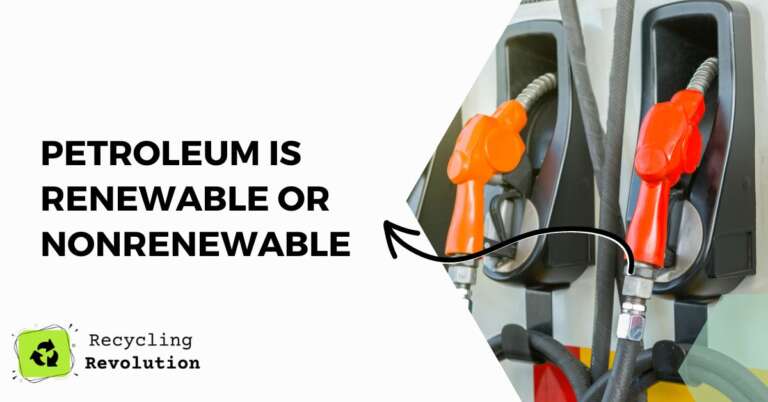In the bustling age of industrialization, the question of resource sustainability often takes center stage. One of the most vital resources driving modern civilization is petroleum. But what’s the real story behind it? Is petroleum renewable or nonrenewable?
TL;DR: Petroleum is primarily considered nonrenewable. It’s formed over millions of years from the remains of ancient plants and animals. Though there are some intriguing discussions about “renewable petroleum,” the timeframes and current technology don’t support its widespread renewability in practical terms.
What Exactly is Petroleum?
It’s essential to understand what petroleum is. Petroleum, commonly referred to as crude oil, is a naturally occurring, yellow-to-black liquid found in geological formations beneath the Earth’s surface. It’s a complex mixture of hydrocarbons, which are compounds made up of hydrogen and carbon.
The Formation of Petroleum: An Age-Old Story
Petroleum originates from the remnants of ancient marine microorganisms. Here’s a simple breakdown:
- Decomposition: Tiny plants and animals die and settle on the seabed. Over time, they’re buried by sediment. In this oxygen-deprived environment, their decomposition is incomplete, turning them into a sludge.
- Transformation: Heat and pressure from accumulating sediment and Earth’s internal processes start to transform this organic sludge. This is a very, very slow cooking process.
- Migration: As heat and pressure continue, the transformed organic materials dissolve into liquid and gaseous hydrocarbons. They start moving through porous rocks, searching for a way out or a place to accumulate.
I recommend visualizing petroleum formation as baking a cake – but one that takes millions of years in the oven!
The Heart of the Matter: Renewable vs. Nonrenewable
Now, to the crux of our exploration.
- Nonrenewable Resources: These are resources that don’t replenish within a human’s lifetime. Once consumed, they’re gone for all practical purposes. Minerals, metals, and yes, petroleum, fall under this category.
- Renewable Resources: Think of resources that can be regenerated or aren’t depleted when used. Sunlight, wind, and water are typical examples.
Note: Just because something is “renewable” doesn’t mean it’s inexhaustible or always sustainable. It’s about the time frame and scale of regeneration.
Given petroleum’s formation process spanning millions of years, it’s clear why it’s classified as nonrenewable. But is that the end of the story?
A Twist in the Tale: Renewable Petroleum?
Here’s where it gets fascinating. Some scientists argue that certain conditions might allow for faster formation of oil, possibly within thousands instead of millions of years. This “abiotic oil” theory, though controversial, adds an exciting layer to our discussion.
Moreover, technologies are emerging to produce synthetic petroleum using algae and other organic materials. The idea is to mimic nature’s process but in a fraction of the time.
While these developments are promising, the scale and efficiency are not yet at a point where they can replace our current petroleum consumption.
The Reality Check: Stats and Studies
Here’s what the numbers say:
- The world consumes approximately 100 million barrels of oil every day.
- As per the U.S. Energy Information Administration, the world’s proven oil reserves are about 1.7 trillion barrels. Simple math tells us this gives us less than 50 years at the current consumption rate.
Remember, extraction becomes more challenging and expensive as we tap into harder-to-reach reservoirs.
Recommendations for a Sustainable Future
Our reliance on petroleum isn’t just about running out of it. It’s about environmental impacts, geopolitical tensions, and economic stability. I recommend:
- Diversifying energy sources: Invest in solar, wind, hydro, and other renewable sources.
- Research and innovation: Back technologies that aim to either make petroleum use more efficient or find sustainable alternatives.
- Conservation: As individuals, reducing our carbon footprint goes a long way.
Petroleum’s Ecological Footprint
A vital aspect of understanding petroleum is not just its renewability but also its ecological implications.
- Carbon Emissions: Petroleum is a significant contributor to global CO2 emissions. Its combustion results in greenhouse gases which are central to the issue of global warming.
- Marine Ecosystem Disruption: Offshore drilling and potential oil spills pose severe threats to marine ecosystems. The Deepwater Horizon oil spill in 2010 is a stark reminder of such disastrous implications.
- Land Degradation: Onshore drilling sites can disrupt local ecosystems, soil quality, and can even induce earthquakes in certain conditions.
Economic and Geopolitical Considerations
- OPEC and the Power Play: The Organization of the Petroleum Exporting Countries (OPEC) wields significant influence on global oil prices. This often leads to geopolitical tensions and economic dependencies.
- The Price Volatility: Petroleum prices are notoriously volatile, influenced by myriad factors from geopolitical tensions to natural disasters.
- The Shift to Renewables: As nations realize the implications of over-dependency on nonrenewable petroleum, there’s an increased economic investment in renewable energy sources. This shift could redefine economic power dynamics in the coming decades.
Advanced Technologies: A Glimpse of Hope?
- Carbon Capture and Storage (CCS): One way to mitigate the environmental impacts of petroleum use is through CCS. It involves capturing CO2 emissions at the source and then storing them underground or using them in some way. This technology is in its nascent stages and holds potential, but scaling it up is a challenge.
- Synthetic Petroleum: The concept isn’t just about mimicking nature’s process in shorter timeframes. It’s also about creating petroleum in labs from scratch using chemical processes. While this might sound like a renewable method, the energy required and the feasibility of producing it at a global scale are challenges yet to be tackled.
Personal Insights and Reflections
I often find myself torn between the marvels of human ingenuity and the harsh reality of our planet’s limitations. Our penchant for growth and progress is commendable, but it also brings forth challenges that test our resilience, adaptability, and foresight.
Note: It’s crucial to remember that while technological advancements offer solutions, they also come with their own set of challenges. The key lies in holistic thinking – considering ecological, economic, and social implications.
A Sustainable Path Forward: Recommendations
I recommend adopting a multipronged approach to our energy conundrum:
- Educate and Advocate: The first step to solving a problem is recognizing and understanding it. Spread awareness about the realities of petroleum and its impacts.
- Support Green Policies: Encourage and support policies that promote sustainable energy solutions, whether it’s tax incentives for renewable energy projects or stricter regulations on carbon emissions.
- Personal Accountability: From carpooling to supporting businesses with green initiatives, our individual choices can create ripples of positive change.
Petroleum’s story is intertwined with the very fabric of our modern civilization. The narratives of economies, wars, innovations, and environmental movements revolve around this black gold. As we stand at the crossroads of sustainability and growth, the path we pave now will define the legacy we leave behind for future generations.
Conclusion
To sum it up, petroleum is largely nonrenewable given the extensive time frame required for its natural formation. While there are whispers of “renewable petroleum” in scientific circles, it’s essential to approach the topic with caution and pragmatism. Our focus should be on sustainable energy solutions to ensure a brighter, greener future.
FAQ:
Are there alternatives to petroleum in the transportation sector?
Yes! Electric vehicles, biofuels, and hydrogen fuel cells are emerging as viable alternatives.
What are the environmental impacts of petroleum?
Burning petroleum releases carbon dioxide, a greenhouse gas. Oil spills, drilling, and transportation also have significant environmental consequences.
Can we ever have a world free from petroleum dependency?
It’s a challenge, given the current infrastructure and technology. But with concerted efforts in research, policy, and public awareness, it’s a possible future!
Stay curious, and never stop exploring the world’s wonders!

